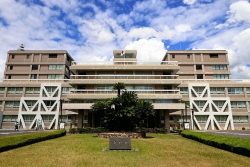12:00 JST, May 28, 2021
The rise in premiums for nursing care insurance has not stopped. The government should accelerate a review of the system so that it can be sustained without difficulty.
According to the Health, Labor and Welfare Ministry, the national average monthly nursing care insurance premium paid by elderly people has been ¥6,014 since April. The figure is more than twice that of fiscal 2000, when the system was introduced, and exceeds ¥6,000 for the first time.
This is because the number of people who need nursing care has increased, but it is a heavy burden on the elderly. Efforts must be made to avoid further drastic hikes.
In principle, people who use the services pay 10% of the costs of their nursing care, with the remainder covered equally by public funds and premiums paid by those aged 40 or older. The premiums for people aged 65 or older are reviewed every three years by municipalities, taking into account future demand for nursing care and other factors.
Nearly 50% of municipalities nationwide have raised their premiums. While many municipalities have decided to hold or lower their premiums in light of the economic impact of the coronavirus pandemic, they have little financial leeway as they have been eking out their own financial resources through such measures as using their funds set up with surplus money.
The ministry also has indicated that the insurance premiums are expected to rise further in the future. It estimates that by fiscal 2025, when the baby boomers turn 75 or older, the average monthly premiums will swell to ¥6,856.
An increasing number of elderly people have been unable to pay premiums and have had their pension benefits and other money seized by their municipalities. This is a serious situation.
To maintain the system by curbing the rise in premiums, it is necessary to review the scope of services and how the burden of paying for them should be borne. It is hoped that the central government will facilitate coordination with local governments and other entities for the next system reform, scheduled for 2023.
One focal point of reform is housework assistance services, such as shopping and cleaning, for those who need only low levels of care. There is criticism that those providing housework assistance services are being used essentially as housemaids.
It is true that these services support the lives of elderly people, but it is questionable whether they are really appropriate as services to be provided to the elderly under the nursing care insurance system. As human resources are limited, they should be used to provide physical care and support for people with high levels of need.
It is desirable that some of these services will be transferred to projects of local governments and will be provided to the elderly in cooperation with nonprofit organizations and other entities. It is also necessary to increase the number of people who can provide such assistance.
The extent to which the government asks recipients of nursing care services for out-of-pocket payments is also an issue. In principle, the out-of-pocket rate is 10% of the total cost. If users have a certain amount of income, they are required to pay 20% or 30%, but users whose income is high enough to fall into that category account for only about 9% of the total number.
A challenge for system reform will be to lower those income thresholds so that those with certain levels of income will pay a more appropriate share.
The central and local governments need to implement policies from multifaceted perspectives so that elderly people can live with peace of mind.
— The original Japanese article appeared in The Yomiuri Shimbun on May 28, 2021.
Top Articles in Editorial & Columns
-

Riku-Ryu Pair Wins Gold Medal: Their Strong Bond Leads to Major Comeback Victory
-

Reciprocal Tariffs Ruled Illegal: Judiciary Would Not Tolerate President’s High-Handed Approach
-

China Provoked Takaichi into Risky Move of Dissolving House of Representatives, But It’s a Gamble She Just Might Win
-

Japan’s Plan for Investment in U.S.: Aim for Mutual Development by Ensuring Profitability
-

Flu Cases Surging Again: Infection Can Also Be Prevented by Humidifying Indoor Spaces
JN ACCESS RANKING
-

Producer Behind Pop Group XG Arrested for Cocaine Possession
-

Japan PM Takaichi’s Cabinet Resigns en Masse
-

Man Infected with Measles Reportedly Dined at Restaurant in Tokyo Station
-

Israeli Ambassador to Japan Speaks about Japan’s Role in the Reconstruction of Gaza
-

Videos Plagiarized, Reposted with False Subtitles Claiming ‘Ryukyu Belongs to China’; Anti-China False Information Also Posted in Japan




















